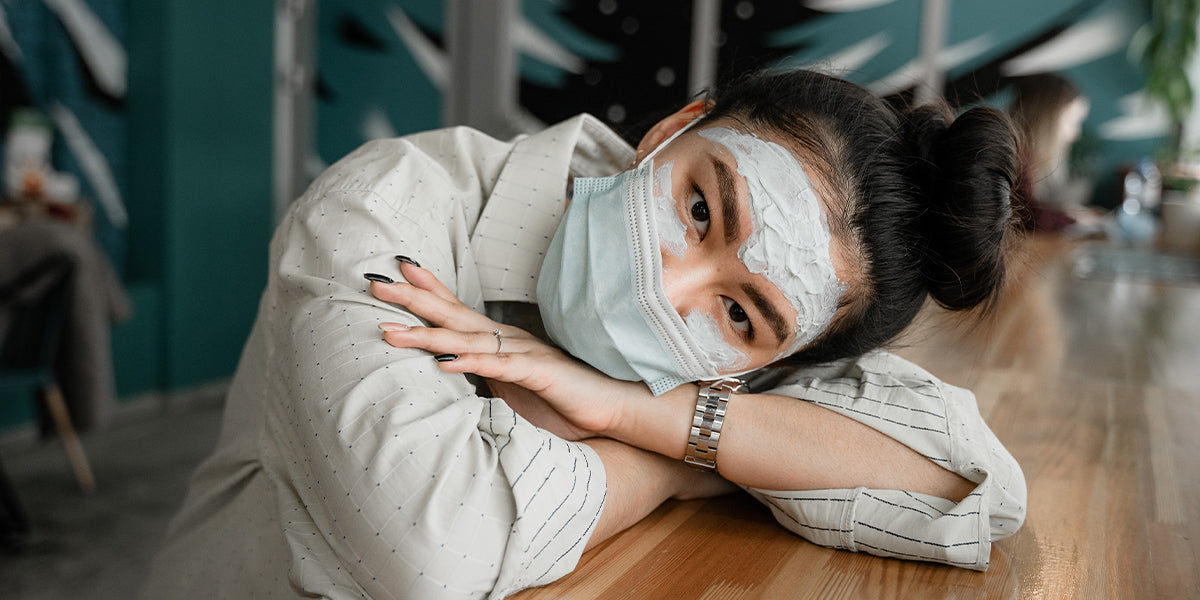
COMBATING SKIN PROBLEMS CAUSED BY CONTINUOUS USE OF FACE MASKS

Before the onset of Corona Virus, face masks were a rare sight in cities. They were worn in India mainly during the months of October and November due to a surge in the air pollution levels but were not seen anywhere after this period. The has comepletely changed now. Many healthcare experts across the world are advocating that one has to continue using the mask untill the end of 2021. Some even prognosticate that face masks will become a necessity in the future, just like mobile phones and the internet. Ministry of Health has also advised using face masks. Face masks are now gradually making a place in our daily lives.
A few weeks ago on social media platforms, one could see images of doctors and nurses with severe redness and marks on their faces due to prolonged use of face masks. The Centre for Disease Control (CDC) in USA has also advocated use of face masks or to wear a cloth covering the face to prevent the spread of corona virus. These masks prevent us from touching our face with hands. They also prevent the spread of droplet infection caused by sneezing or coughing . The Centre for Disease Control (CDC) in USA has also advocated the use of face masks to prevent the spread of corona virus.
Face masks & skin
A team from Universityof Huddersfield’s Institute of Skin Integrity and Infection Prevention did a study published in the Journal of Wound Care in which one may find that skin can suffer great consequences from constant face covering. The study states that most face masks have tight facial fit which forms a seal around the mouth and nose area. The tight facial fit feature prevents the air-borne virus to enter the respiratory system, however; it creates friction and pressure on the skin. This “intense and prolonged” pressure leads to several skin problems.
This is how the skin responds to it –
- Moisture and vapour, alongwith secretions like saliva, mucus and sebum are trapped inside the mask.
- These secretions disrupt the natural lipid layer of skin. It causes pH imbalance.
- Humidity and heat from the environment further accentuates perspiration.
- The material of the face masks also have certain chemicals that can cause allergic reactions As a result, the skin gets red, flaky, itchy and swells up.
- Breakouts and acne problems also arises for people with oily skin.
Once we remove the mask from face, the sudden gush of air often over dries the skin. Dust particles suspended in the air also cause skin rashes.
The question arises; should one avoid using face mask? The answer is, absolutely not. Face masks, hand sanitizers and social distancing are the safety measures necessary for fighting Covid-19. However, some skincare tips can be followed to tackle this effectively.
Tips for Before and After face mask use
Skin experts and dermatologists have recommended a few guidelines for combating skin problems while wearing a face mask.
1. Wash face before and after using a mask: It equally important to wash your face as well as your hands. Use a mild “sulphate-free” facial cleanser to remove sweat and grime from your face. People with oily skin should look for ingredients that controls excess oil and help balancing the pH of your skin. A good facial cleanser will effectively remove bacteria and unclog pores. It reduces the risk of breakouts and acne problems. Ingredients like Neem, Aloe Vera and Turmeric have excellent anti-bacterial effects. They also control excess oil and soothe skin. Sulfate-free formula will not cause over-drying of skin after face wash. Massage your face with a cleanserfor atleast sixty seconds.
2. Use a light moisturiser: Apply a gel-based moisturiser at least 30 minutes before using a face mask. This light moisturiser will reduce the friction on skin. Choose ingredients like Sandalwood oil, Avocado and Aloe Vera which are cooling in nature and light on skin as well. Use this moisturiser after using a facial cleanser. For oily skin, a moisturiser with antiseptic benefits is a must. These ingredients will help hydratinf skinand balancing the skin’s oil production.
3. Avoid makeup under the mask: Manhattan based dermatologist, Dr. Hadley King suggests not using makeup on the entire face. One may resort to eye makeup like kohl, eye liners and mascara. Foundations and heavy concealers are made up of harmful chemicals like silicones and petrochemicals. These ingredients react with skin due to increased humidity under the mask which could affect sebum production and eventually causing breakouts and acne problems.
4. Do not skip Toner: After washing face with facial cleanser, use an alcohol-free toner on skin. Toners help to minimize pores and maintain the pH balance of skin. Some ingredients such as Rose and Cucumber help in calming irritation on skin. Allow your skin to absorb the toner naturally. Apply a light moisturiser after after toning. Avoid application of astringents on skin as this would cause excess drying and irritation.
5. Exfoliate: You may use a gentle scrub on face at least once in a week. Exfoliators help in removing dead skin, blackheads and whiteheads. Exfoliation helps in cleansing pores and minimising the risk of bacterial growth. Use a scrub for at least 6 to 7 minutes with gentle massage either in upward direction or circular motion. Ingredients like rock salt, turmeric and apricots are great for exfoliation purpose. Make sure that the scrub has mild granules that doesn’t harm skin.



